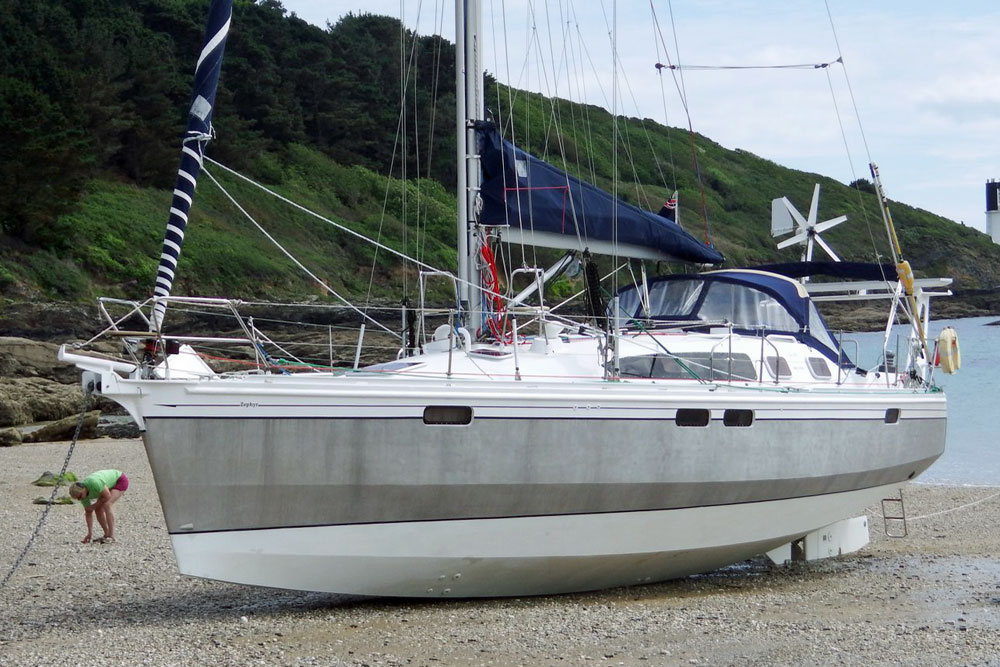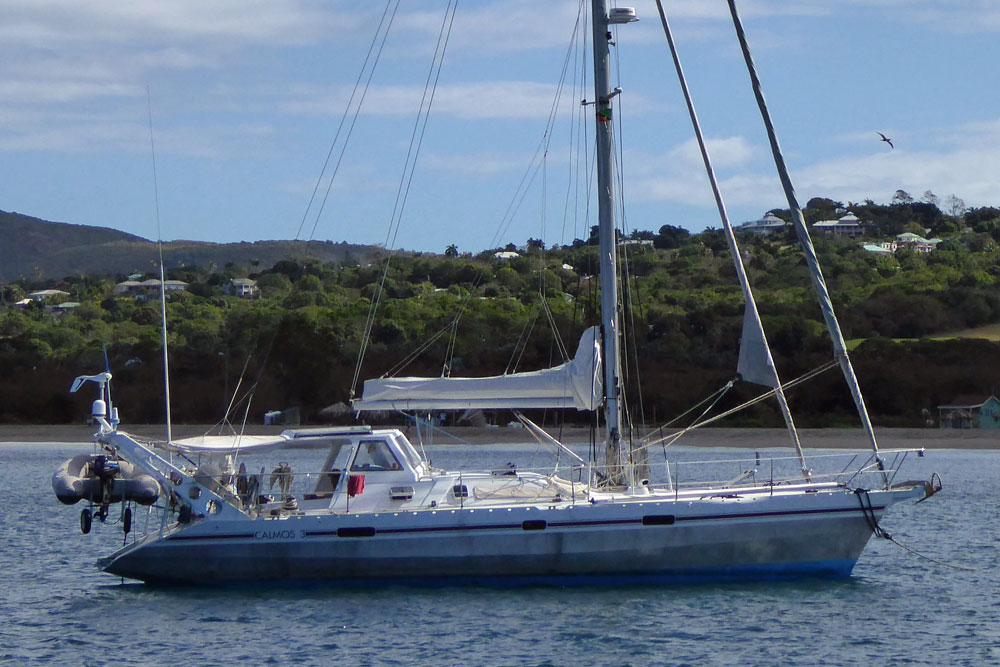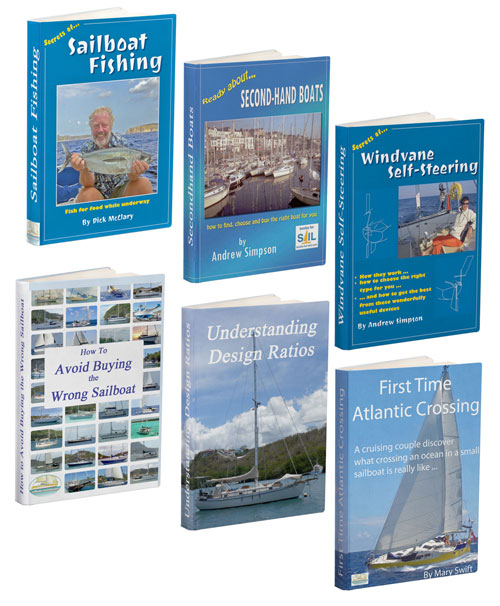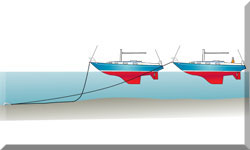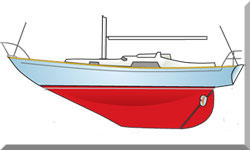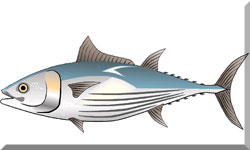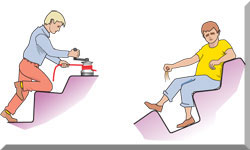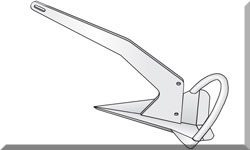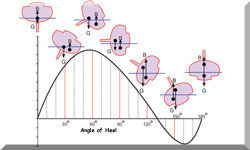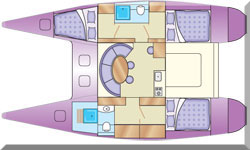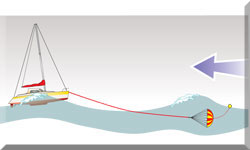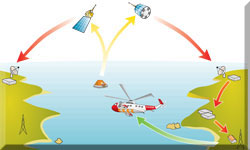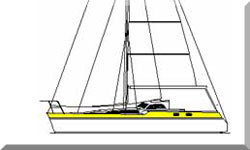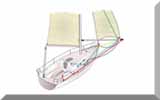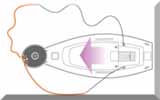- Home
- Cruising Yachts 40' to 45'
- Ovni 395
The Ovni 395 Sailboat
Specs & Key Performance Indicators
The Ovni 395 was designed by Philippe Briand, a prominent French naval architect and was manufactured by Alubat, a well-regarded boat building company located in Château-d'Olonne, France. Alubat has long been recognized for its craftsmanship in aluminum boat construction, producing vessels designed for extensive cruising. This sailboat is particularly noted for its ability to handle long voyages, combining comfort with practical features.
The Ovni 395 sailboat was available in several configurations. Buyers could choose between two or three cabins, one or two heads, and different layouts for the saloon, galley, and navigation station. It also had a hydraulic lifting keel and rudder that allowed it to explore shallow waters and even beach itself as shown above.
Published Specification for the Ovni 395
Underwater Profile: Lifting keel
Hull Material: Aluminium
Length Overall: 42'1" (12.8m)
Waterline Length: 36'9" (11.2m)
Beam: 13'6" (4.1m)
Draft: Keel down 6'11" (2.1m), Keel up 1'11" (0.6m)
Rig Type: Masthead sloop
Displacement: 22,046lb (10,000kg
Designer: Philippe Briand
Builder: Chantier Alubat (France)
Year First Built: 2004
Year Last Built: 2018
Number Built: 70
Owners Association: Ovni Owners Association
Published Design Ratios for the Ovni 395
The Ovni 395's Sail Area/Displacement (SA/D) Ratio of 18.3 positions it within the "reasonably good performance" category, indicating it is neither underpowered nor exceptionally high-performance, but balanced for effective sailing.
The Ballast/Displacement Ratio of 33.0 suggests a moderate ability to stand up to wind. However, it's important to note the limitations of this ratio as it does not account for ballast placement, which is crucial for understanding the boat's stability characteristics in varying conditions.
With a Displacement/Length (D/L) Ratio of 199, the Ovni 395 is classified under Light Displacement, meaning it requires less sail area to reach its designed hull speed compared to heavier boats.
Its Comfort Ratio of 27.8 indicates a motion comfort level that aligns with moderate coastal cruisers, suggesting stable and reasonably comfortable passage-making capabilities, though potentially less suited for the roughest bluewater conditions without discomfort.
Lastly, the Capsize Screening Formula rate of 1.9 underscores the design's suitability for ocean passages, highlighting its safety in potential capsize scenarios compared to broader-beamed or heavier vessels.
It should be acknowledged, however, that these ratios, while informative, offer a theoretical depiction of behavior. Real-world performance can be subject to variability due to factors like load condition, sea state, and crew skill. Notably, modern vessel design considerations such as beamy cruisers with plumb bows often defy traditional ratio expectations while still proving capable and safe for bluewater sailing.
This article was written with the assistance of Gemini, a large language model developed by Google. Gemini was used to gather information, summarize research findings, and provide suggestions for the content and structure of the article.
Yachting Press Reviews...
Cruising World tells us:
"The utilitarian styling of the Ovni 395 may narrow its market appeal, but any pragmatic cruiser will gladly allow function to lead fashion out onto the high seas. Philippe Briand has drawn a no-nonsense, go-anywhere cruiser that will carry its crew safely, quickly, and in comfort through any ocean of the world. However, those more used to fiberglass hulls must be aware that aluminum boats require extra attention with regard to stray electrical current, wiring, sacrificial anodes, and paint systems.
The Ovni 395 isn’t limited to oceans alone. The hydraulic lifting keel and rudder (with a 1-foot-11-inch draft), protective propeller skeg, and flat grounding plate just cry out for picnic beaching and gunkholing away from crowds."
Other sailboats in the Ovni range include:
Recent Articles
-
Is Marine SSB Still Used?
Apr 15, 25 02:05 PM
You'll find the answer to this and other marine SSB-related questions right here... -
Is An SSB Marine Radio Installation Worth Having on Your Sailboat?
Apr 14, 25 02:31 PM
SSB marine radio is expensive to buy and install, but remains the bluewater sailors' favourite means of long-range communication, and here's why -
Correct VHF Radio Procedure: Your Questions Answered
Apr 14, 25 08:37 AM
Got a question about correct VHF radio procedure? Odds are you'll find your answer here...
